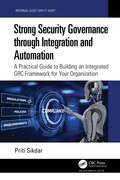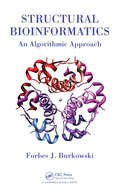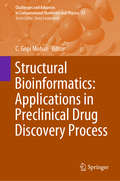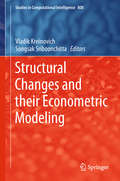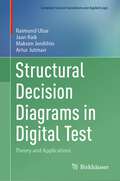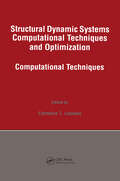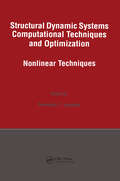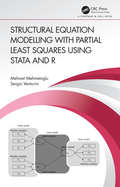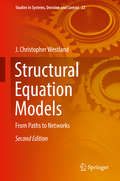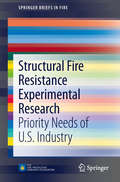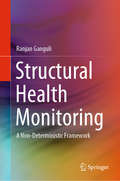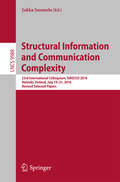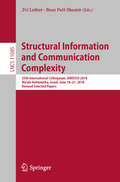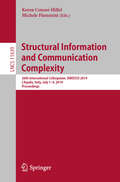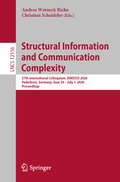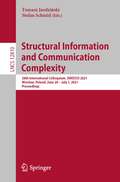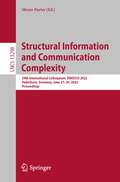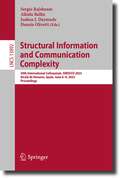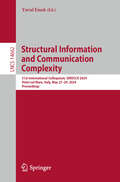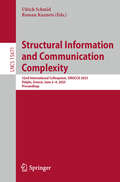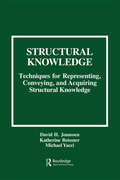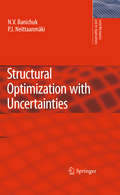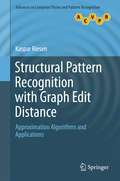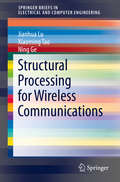- Table View
- List View
Strong Security Governance through Integration and Automation: A Practical Guide to Building an Integrated GRC Framework for Your Organization (Internal Audit and IT Audit)
by Priti SikdarThis book provides step by step directions for organizations to adopt a security and compliance related architecture according to mandatory legal provisions and standards prescribed for their industry, as well as the methodology to maintain the compliances. It sets a unique mechanism for monitoring controls and a dashboard to maintain the level of compliances. It aims at integration and automation to reduce the fatigue of frequent compliance audits and build a standard baseline of controls to comply with the applicable standards and regulations to which the organization is subject. It is a perfect reference book for professionals in the field of IT governance, risk management, and compliance. The book also illustrates the concepts with charts, checklists, and flow diagrams to enable management to map controls with compliances.
Structural Analysis in the Social Sciences: Mobilizing Poor Voters
by Mariela SzwarcbergDemocracy has provided opportunities for political representation and accountability, but it has also created incentives for creating and maintaining clientelistic networks. Why has clientelism consolidated with the introduction of democracy? Drawing on network analysis, Mobilizing Poor Voters answers this question by describing and explaining the emergence, maintenance, and disappearance of political, partisan, and social networks in Argentina. Combining qualitative and quantitative data gathered during twenty-four months of field research in eight municipalities in Argentina, Mobilizing Poor Voters shows that when party leaders distribute political promotions to party candidates based only on the number of voters they mobilize, party leaders incentivize the use of clientelistic strategies among candidates competing to mobilize voters in poor neighborhoods. The logic of perverse incentives examined in this book explains why candidates who use clientelism succeed in getting elected and re-elected over time, contributing to the consolidation of political machines at the local level.
Structural Bioinformatics: An Algorithmic Approach (Chapman & Hall/CRC Computational Biology Series)
by Forbes J. BurkowskiThe Beauty of Protein Structures and the Mathematics behind Structural BioinformaticsProviding the framework for a one-semester undergraduate course, Structural Bioinformatics: An Algorithmic Approach shows how to apply key algorithms to solve problems related to macromolecular structure.Helps Students Go Further in Their Study of Structural Biolog
Structural Bioinformatics: Applications in Preclinical Drug Discovery Process (Challenges and Advances in Computational Chemistry and Physics #27)
by C. Gopi MohanThis book reviews the advances and challenges of structure-based drug design in the preclinical drug discovery process, addressing various diseases, including malaria, tuberculosis and cancer. Written by internationally recognized researchers, this edited book discusses how the application of the various in-silico techniques, such as molecular docking, virtual screening, pharmacophore modeling, molecular dynamics simulations, and residue interaction networks offers insights into pharmacologically active novel molecular entities. <P><P> It presents a clear concept of the molecular mechanism of different drug targets and explores methods to help understand drug resistance. In addition, it includes chapters dedicated to natural-product- derived medicines, combinatorial drug discovery, the CryoEM technique for structure-based drug design and big data in drug discovery. <P><P> The book offers an invaluable resource for graduate and postgraduate students, as well as for researchers in academic and industrial laboratories working in the areas of chemoinformatics, medicinal and pharmaceutical chemistry and pharmacoinformatics.
Structural Changes and their Econometric Modeling (Studies in Computational Intelligence #808)
by Vladik Kreinovich Songsak SriboonchittaThis book focuses on structural changes and economic modeling. It presents papers describing how to model structural changes, as well as those introducing improvements to the existing before-structural-changes models, making it easier to later on combine these models with techniques describing structural changes. The book also includes related theoretical developments and practical applications of the resulting techniques to economic problems. Most traditional mathematical models of economic processes describe how the corresponding quantities change with time. However, in addition to such relatively smooth numerical changes, economical phenomena often undergo more drastic structural change. Describing such structural changes is not easy, but it is vital if we want to have a more adequate description of economic phenomena – and thus, more accurate and more reliable predictions and a better understanding on how best to influence the economic situation.
Structural Decision Diagrams in Digital Test: Theory and Applications (Computer Science Foundations and Applied Logic)
by Jaan Raik Raimund Ubar Maksim Jenihhin Artur JutmanThis is the first book that sums up test-related modeling of digital circuits and systems by a new structural-decision-diagrams model. The model represents structural and functional information jointly and opens a new area of research.The book introduces and discusses applications of two types of structural decision diagrams (DDs): low-level, structurally synthesized binary DDs (SSBDDs) and high-level DDs (HLDDs) that enable diagnostic modeling of complex digital circuits and systems.Topics and features:Provides the definition, properties and techniques for synthesis, compression and optimization of SSBDDs and HLDDsProvides numerous working examples that illustrate the key points of the textDescribes applications of SSBDDs and HLDDs for various electronic design automation (EDA) tasks, such as logic-level fault modeling and simulation, multi-valued simulation, timing-critical path identification, and test generationDiscusses the advantages of the proposed model to traditional binary decision diagrams and other traditional design representationsCombines SSBDDs with HLDDs for multi-level representation of digital systems for enabling hierarchical and cross-level solving of complex test-related tasksThis unique book is aimed at researchers working in the fields of computer science and computer engineering, focusing on test, diagnosis and dependability of digital systems. It can also serve as a reference for graduate- and advanced undergraduate-level computer engineering and electronics courses.Three authors are affiliated with the Dept. of Computer Systems at the Tallinn University of Technology, Estonia: Raimund Ubar is a retired Professor, Jaan Raik and Maksim Jenihhin are tenured Professors. Artur Jutman, PhD, is a researcher at the same university and the CEO of Testonica Lab Ltd., Estonia.
Structural Dynamic Systems Computational Techniques and Optimization: Computational Techniques (Gordon and Breach International Series in Engineering, Technolo)
by Cornelius T. LeondesComputational techniques for the analysis and design of structural dynamic systems using numerical methods have been the focus of an enormous amount of research for several decades. In general, the numerical methods utilized to solve these problems include two phases: (a) spatial discretization by either the finite element method (FEM) or the finite difference method (FDM), and (b) solution of systems of time dependent second-order ordinary differential equations. In addition, the significantly powerful advances in computer systems capabilities have put on the desks of structural systems designers enormous computing power either by means of increasingly effective computer workstations or else through PCs (personal computers), whose increasing power has succeeded in marginalizing the computational power differences between PCs and workstations in many cases. This volume is a comprehensive treatment of the issues involved in computational techniques in structural dynamic systems.
Structural Dynamic Systems Computational Techniques and Optimization: Nonlinear Techniques (Gordon and Breach International Series in Engineering, Technolo)
by Cornelius T. LeondesNonlinear structural dynamic systems which are multi-degree of freedom systems involve, for instance, matrix dynamic equilibrium equations, which can be of various order up to very high order. In these equations, the nonlinear quantities can be dependent on time and other terms, such as scalar variables, which are dependent on time. Frequency response and response time derivatives would also, of course, be involved. Nonlinear terms can account for dissipative phenomena and can be due to other physical phenomena. In fact, many engineering structures involve time-dependent properties such as, stiffness elements of specific structural components which can change according to the stress level. Other examples of dynamic elements of nonlinear structural systems can include system mass and damping distribution elements which evolve with time, such as railway or highway bridges and other structures, which interact with external agencies generating the system motion (for example, trains, a queue of vehicles, or other external agencies.) This volume is a rather comprehensive treatment of many of the techniques and methods which are utilized for the analysis of nonlinear structural dynamic systems.
Structural Equation Modelling with Partial Least Squares Using Stata and R
by Mehmet Mehmetoglu Sergio VenturiniPartial least squares structural equation modelling (PLS-SEM) is becoming a popular statistical framework in many fields and disciplines of the social sciences. The main reason for this popularity is that PLS-SEM can be used to estimate models including latent variables, observed variables, or a combination of these. The popularity of PLS-SEM is predicted to increase even more as a result of the development of new and more robust estimation approaches, such as consistent PLS-SEM. The traditional and modern estimation methods for PLS-SEM are now readily facilitated by both open-source and commercial software packages. This book presents PLS-SEM as a useful practical statistical toolbox that can be used for estimating many different types of research models. In so doing, the authors provide the necessary technical prerequisites and theoretical treatment of various aspects of PLS-SEM prior to practical applications. What makes the book unique is the fact that it thoroughly explains and extensively uses comprehensive Stata (plssem) and R (cSEM and plspm) packages for carrying out PLS-SEM analysis. The book aims to help the reader understand the mechanics behind PLS-SEM as well as performing it for publication purposes. Features: Intuitive and technical explanations of PLS-SEM methods Complete explanations of Stata and R packages Lots of example applications of the methodology Detailed interpretation of software output Reporting of a PLS-SEM study Github repository for supplementary book material The book is primarily aimed at researchers and graduate students from statistics, social science, psychology, and other disciplines. Technical details have been moved from the main body of the text into appendices, but it would be useful if the reader has a solid background in linear regression analysis.
Structural Equation Models: From Paths to Networks (Studies in Systems, Decision and Control #22)
by J. Christopher WestlandThis new edition surveys the full range of available structural equation modeling (SEM) methodologies. The book has been updated throughout to reflect the arrival of new software packages, which have made analysis much easier than in the past. Applications in a broad range of disciplines are discussed, particularly in the social sciences where many key concepts are not directly observable. This book presents SEM’s development in its proper historical context–essential to understanding the application, strengths and weaknesses of each particular method. This book also surveys the emerging path and network approaches that complement and enhance SEM, and that are growing in importance. SEM’s ability to accommodate unobservable theory constructs through latent variables is of significant importance to social scientists. Latent variable theory and application are comprehensively explained and methods are presented for extending their power, including guidelines for data preparation, sample size calculation and the special treatment of Likert scale data. Tables of software, methodologies and fit statistics provide a concise reference for any research program, helping assure that its conclusions are defensible and publishable.
Structural Fire Resistance Experimental Research: Priority Needs of U.S. Industry
by Kathleen H AlmandStructural Fire Resistance Experimental Research - Priority Needs of U.S. Industry provides a synthesis of stakeholder input to a prioritized agenda for research at the National Fire Research Laboratory (NFRL) at the National Institute of Standards and Technology (NIST) designed to accelerate the implementation of performance-based fire engineering for structures. The NFRL presents a broad range of unanswered questions regarding the performance of real structures in fire conditions, and informs performance-based design methods and standards in this field. The authors conducted a comprehensive literature review of large-scale structural fire testing and compiled research needs from a variety of sources. The book addresses major issues of broad concern in the fire community, such as real fire exposure and structural response, composite floor system performance, enhancing modeling performance, and understanding the embedded safety features in design methods. It concludes with a prioritized set of research recommendations for the NIST facility. The scope of issues addressed and broad range of content make this a valuable book for researchers in all aspects of fire resistance experimentation. It will also be useful for those who work with engineering standards for structures.
Structural Health Monitoring: A Non-Deterministic Framework
by Ranjan GanguliThis book discusses systems of damage detection and structural health monitoring in mechanical, civil, and aerospace structures. It utilizes principles of fuzzy logic, probability theory, and signal processing to develop systems and approaches that are robust in the presence of both noise in the data and variations in properties of materials which are intrinsic to the process of mass production. This volume will be useful to graduate students, researchers, and engineers working in this area, especially those looking to understand and address model uncertainty in their algorithms.
Structural Information and Communication Complexity
by Jukka SuomelaThis book constitutes the refereed proceedings of the 23rd International Colloquium on Structural Information and Communication Complexity, SIROCCO 2016, held in Helsinki, Finland in July 2016. The 25 full papers presented were carefully reviewed and selected from 50 submissions. The papers are organized around the following topics: message passing; shared memory; mobile agent; data dissemination and routing.
Structural Information and Communication Complexity: 25th International Colloquium, SIROCCO 2018, Ma'ale HaHamisha, Israel, June 18-21, 2018, Revised Selected Papers (Lecture Notes in Computer Science #11085)
by Zvi Lotker Boaz Patt-ShamirThis book constitutes the refereed post-conference proceedings of the 25th International Colloquium on Structural Information and Communication Complexity, SIROCCO 2018, held in Ma'ale HaHamisha, Israel, in June 2018. The 23 full papers and 8 short papers presented were carefully reviewed and selected from 47 submissions. They are devoted to the study of the interplay between structural knowledge, communications, and computing in decentralized systems of multiple communicating entities and cover a large range of topics.
Structural Information and Communication Complexity: 26th International Colloquium, SIROCCO 2019, L'Aquila, Italy, July 1–4, 2019, Proceedings (Lecture Notes in Computer Science #11639)
by Michele Flammini Keren Censor-HillelThis book constitutes the refereed conference proceedings of the 26th International Colloquium on Structural Information and Communication Complexity, SIROCCO 2019, held in L’Aquila, Italy, in July 2019.The 19 full papers and 9 short papers presented in this book were carefully reviewed and selected from 39 submissions. They are devoted to the study of the interplay between structural knowledge, communication, and computing in decentralized systems of multiple communicating entities.
Structural Information and Communication Complexity: 27th International Colloquium, SIROCCO 2020, Paderborn, Germany, June 29–July 1, 2020, Proceedings (Lecture Notes in Computer Science #12156)
by Christian Scheideler Andrea Werneck RichaThis book constitutes the refereed conference proceedings of the 27th International Colloquium on Structural Information and Communication Complexity, SIROCCO 2020, held in Paderborn, Germany, in June 2020.* The 19 full papers and 2 invited papers presented in this book were carefully reviewed and selected from 41 submissions. They are divided into seven sections, i.e. invited papers; mobile robots; dynamic graphs; network communication; multi-agent systems; communication complexity; and game theory. * The conference was held virtually due to the COVID-19 pandemic.
Structural Information and Communication Complexity: 28th International Colloquium, SIROCCO 2021, Wrocław, Poland, June 28 – July 1, 2021, Proceedings (Lecture Notes in Computer Science #12810)
by Stefan Schmid Tomasz JurdzińskiThis book constitutes the refereed conference proceedings of the 28th International Colloquium on Structural Information and Communication Complexity, SIROCCO 2021, held in Wrocław, Poland, in June 2021. Due to COVID-19, the conference will be held online. The 20 full papers presented in this book were carefully reviewed and selected from 48 submissions. The papers are solicited from all areas of study of local structural knowledge and global communication and computational complexities. Among the typical areas are distributed computing, communication networks, game theory, parallel computing, social networks, mobile computing
Structural Information and Communication Complexity: 29th International Colloquium, SIROCCO 2022, Paderborn, Germany, June 27–29, 2022, Proceedings (Lecture Notes in Computer Science #13298)
by Merav ParterThis book constitutes the refereed conference proceedings of the 29th International Colloquium on Structural Information and Communication Complexity, SIROCCO 2022, held in Paderborn, Germany, in June 2022. The 16 full papers presented in this book were carefully reviewed and selected from 30 submissions. SIROCCO is devoted to the study of the interplay between structural knowledge, communication, and computing in decentralized systems of multiple communicating entities. Special emphasis is given to innovative approaches leading to better understanding of the relationship between computing and communication.
Structural Information and Communication Complexity: 30th International Colloquium, SIROCCO 2023, Alcalá de Henares, Spain, June 6–9, 2023, Proceedings (Lecture Notes in Computer Science #13892)
by Sergio Rajsbaum Alkida Balliu Joshua J. Daymude Dennis OlivettiThis book constitutes the refereed proceedings of the 30th International Colloquium on Structural Information and Communication Complexity, SIROCCO 2023, held in Alcalá de Henares, Spain, during June 6–9, 2023.The 26 full papers presented in this book were carefully reviewed and selected from 48 submissions. SIROCCO is devoted to the study of the interplay between structural knowledge, communication, and computing in decentralized systems of multiple communicating entities. Special emphasis is given to innovative approaches leading to better understanding of the relationship between computing and communication. This is the 30th edition of SIROCCO, and 3 of the 26 papers in this book are devoted to celebrating this fact, plus an additional paper about a recent trend to study special models of computation.
Structural Information and Communication Complexity: 31st International Colloquium, SIROCCO 2024, Vietri sul Mare, Italy, May 27–29, 2024, Proceedings (Lecture Notes in Computer Science #14662)
by Yuval EmekThis book constitutes the refereed proceedings of the 31th International Colloquium on Structural Information and Communication Complexity, SIROCCO 2024, held in Haifa, Israel in May 2024. The 24 full papers and 6 short papers presented in this book were carefully reviewed and selected from 49 submissions. SIROCCO is devoted to the study of the interplay between structural knowledge, communication, and computing in decentralized systems of multiple communicating entities. Special emphasis is given to innovative approaches leading to better understanding of the relationship between computing and communication.
Structural Information and Communication Complexity: 32nd International Colloquium, SIROCCO 2025, Delphi, Greece, June 2–4, 2025, Proceedings (Lecture Notes in Computer Science #15671)
by Ulrich Schmid Roman KuznetsThis book constitutes the refereed proceedings of the 32nd International Colloquium on Structural Information and Communication Complexity, SIROCCO 2025, held in Delphi, Greece in June 2025. The 24 full papers and 4 brief announcements included in the proceedings were carefully reviewed and selected from a total of 57 submissions. They focus on innovative methodological and solution approaches in structural knowledge, communication, and computing in decentralized systems of multiple comunicating entities.
Structural Knowledge: Techniques for Representing, Conveying, and Acquiring Structural Knowledge
by David H. Jonassen Katherine Beissner Michael YacciThis book introduces the concept of a hypothetical type of knowledge construction -- referred to as structural knowledge -- that goes beyond traditional forms of information recall to provide the bases for knowledge application. Assuming that the validity of the concept is accepted, the volume functions as a handbook for supporting the assessment and use of structural knowledge in learning and instructional settings. It's descriptions are direct and short, and its structure is consistent. Almost all of the chapters describe a technique for representing and assessing structural knowledge acquisition, conveying knowledge structures through direct instruction, or providing learners with strategies that they may use to acquire structural knowledge. These chapters include the following sections in the same sequence: * description of the technique and its theoretical or conceptual rationale * examples and applications * procedures for development and use * effectiveness -- learner interactions and differences, and advantages and disadvantages * references to the literature. The chapters are structured to facilitate access to information as well as to illuminate comparisons and contrasts among the techniques.
Structural Optimization with Uncertainties
by Pekka Neittaanmäki N. V. BanichukThis monograph is devoted to the exposition of new ways of formulating problems of structural optimization with incomplete information and techniques of solution. Research results concerning the optimum shape and structural properties of the bodies subjected to external loadings are recapitulated. Problems of optimal design with incomplete information, accounting for the interaction between the structure and its environment, properties of materials, existence of initial damages and damage accumulation are studied. This volume treats overcoming the corresponding mathematical difficulties caused by raising local functionals. Most of the book is devoted to the minimax approach using worst case scenarios, i.e. the so-called guaranteed approach. However, the probabilistic approach, that does not guarantee the result, is also described in the monograph, because it gives more "optimistic" results. Also, the mixed probabilistic guaranteed approach is discussed and applied for the solution of structural optimization problems with uncertainties.
Structural Pattern Recognition with Graph Edit Distance
by Kaspar RiesenThis unique text/reference presents a thoroughintroduction to the field of structural pattern recognition, with a particularfocus on graph edit distance (GED). The book also provides a detailed review ofa diverse selection of novel methods related to GED, and concludes bysuggesting possible avenues for future research. Topics and features: formallyintroduces the concept of GED, and highlights the basic properties of thisgraph matching paradigm; describes a reformulation of GED to a quadraticassignment problem; illustrates how the quadratic assignment problem of GED canbe reduced to a linear sum assignment problem; reviews strategies for reducing boththe overestimation of the true edit distance and the matching time in theapproximation framework; examines the improvement demonstrated by the describedalgorithmic framework with respect to the distance accuracy and the matchingtime; includes appendices listing the datasets employed for the experimental evaluationsdiscussed in the book.
Structural Processing for Wireless Communications
by Jianhua Lu Xiaoming Tao Ning GeThis brief presents an alternative viewpoint on processing technology for wireless communications based on recent research advances. As a lever in emerging processing technology, the structure perspective addresses the complexity and uncertainty issues found in current wireless applications. Likewise, this brief aims at providing a new prospective to the development of communication technology and information science, while stimulating new theories and technologies for wireless systems with ever-increasing complexity. Readers of this brief may range from graduate students to researchers in related fields.
